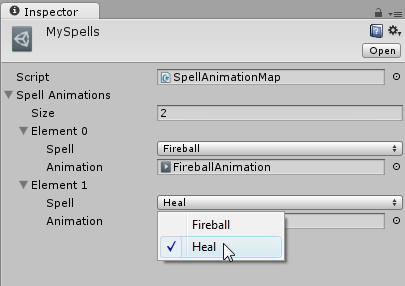One quick way to get key-value pairs in Unity's inspector is to define a serializable entry class, and then use an array or List<> of them. eg...
public class SpellAnimationMap : ScriptableObject
{
[System.Serializable]
public class SpellAnimationEntry
{
public Spell spell;
public AnimationClip animation;
}
public SpellAnimationEntry[] spellAnimations;
}
Automatically, this will give you a resizeable list in the inspector where you can enter the key and value, without needing to write a custom inspector.
The result looks like this:

(One trick: if the serialized entry class contains a "Name" field, that string will be displayed instead of the bland "Element 0" headings. Useful if you have more complex data you want to be able to navigate efficiently.)
Making this a ScriptableObject allows you to treat it as an Asset shared between entity types/instances that need the same animation set, avoiding overhead of duplicating the list for each. (Other classes tend to be serialized per-instance in Unity). To go this route, you'll need to add a small editor script to let you create instances of these in your Assets folder.
Edit: now it's even easier - you can just add this attribute above your ScriptableObject:
[CreateAssetMenu(fileName = "fileName.asset", menuName = "Some Folder/Menu Label")]
This puts the ScriptableObject into your Create menu, like so:

You can optionally make the array private and serialized so that it still shows up in the inspector, but add a public Dictionary (or private dictionary with a public GetAnimation(Spell spell) method) for clients to consume for more efficient lookups. In its OnEnable() method, the SpellAnimationMap can iterate through its inspector-populated array to build this dictionary once, again sharing the benefit between all client instances. (Note that OnEnable() is also called in the editor when the asset is first created, so be sure to check that your array is non-null before you try to read it)
Finally, you can add as much into this entry datatype as you need. It could include the prefab too, for instance, or any number of other bits of data you want to link to the spell key.
It's also possible to write custom inspectors to populate Dictionary<,> fields directly, but the impression that I get is that it's fussy to get working smoothly.


